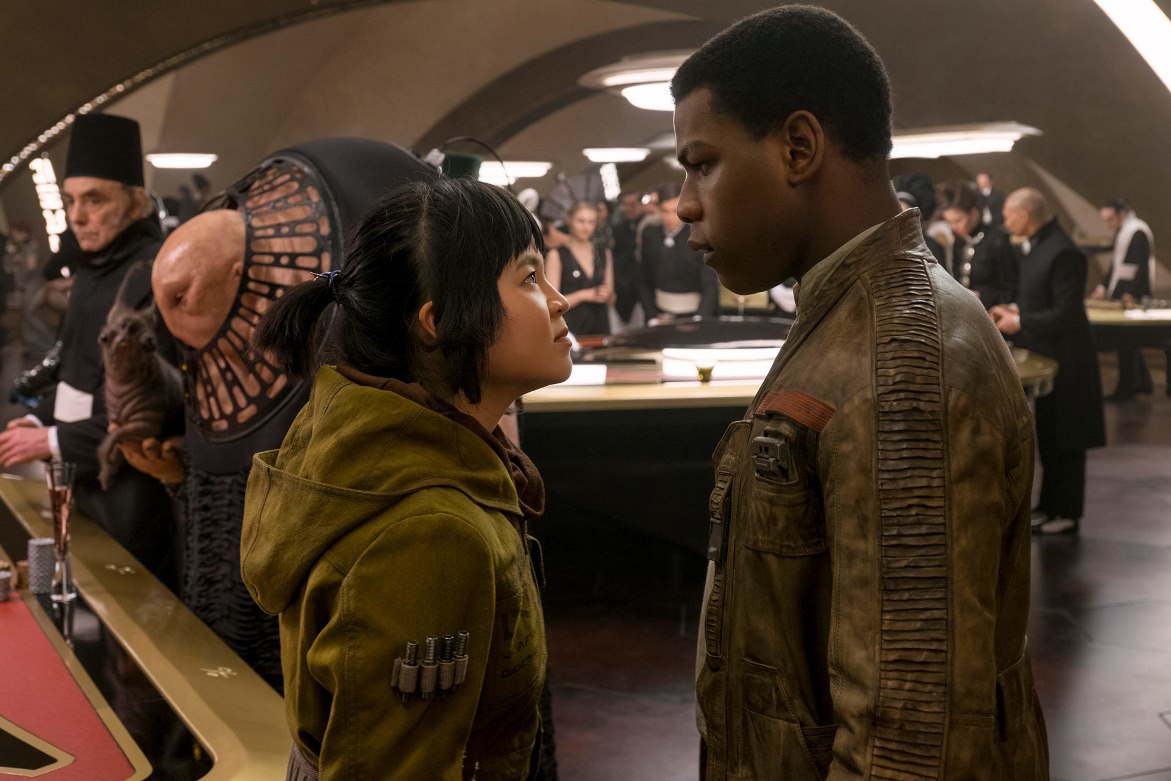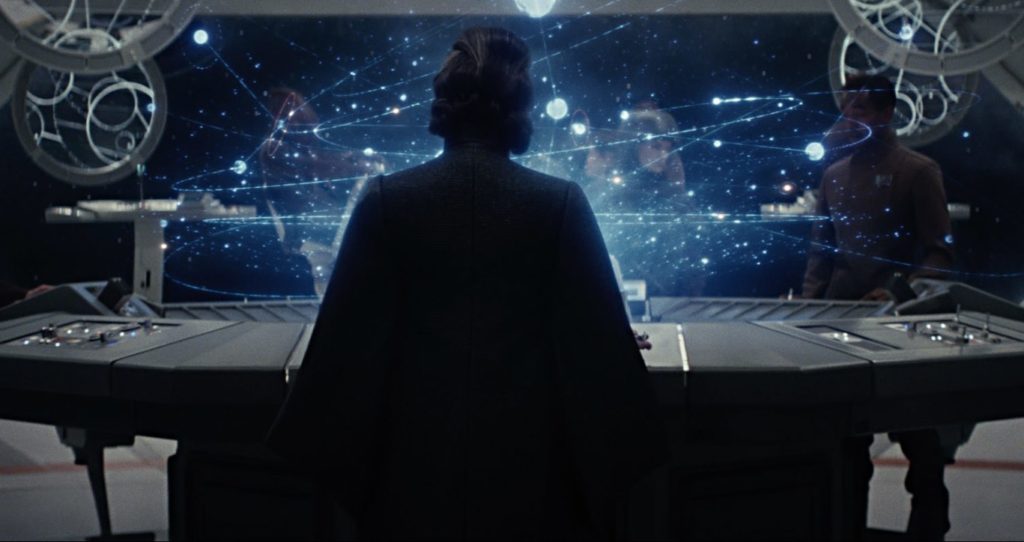Translating deep thinking into common sense
Drawn by Love or Driven by Hate? Moral Choices in The Last Jedi

By Carrie-Ann Biondi
March 1, 2018
SUBSCRIBE TO SAVVY STREET (It's Free)
And Michael Gordon Shapiro
Introduction
“That’s how we’re gonna win. Not fighting what we hate, saving what we love.”
Winter 2017 saw us lining up yet again, donning Jedi attire, wearing Stormtrooper helmets, or sporting Princess Leia hairstyles. At last we took our seats in the local cinema to see the latest installment in the Star Wars series: Episode VIII: The Last Jedi. We awaited the heroic opening strains of a John Williams score, eager to be transported to “a galaxy far, far away. …” One of the more memorable lines from the film is: “That’s how we’re gonna win. Not fighting what we hate, saving what we love.” This line stands out for offering a blatantly false dichotomy, especially in the context in which it was uttered. Yet it lingers in one’s mind because it contains a kernel of wisdom central to the Star Wars saga.
Love, Hate, and False Dichotomies
Historically, the Star Wars films have never been fonts of good advice. Jedi are told to trust their feelings—unless those feelings are of anger or romantic love, which they’re required to repress. Yoda seems hostile to the notion of planning for the future, weirdly so given his own spotty track record with predictions. But the Jedi credo isn’t presented to us as morally authoritative. For example, the “thou shalt not love” policy is contentious and leads to disastrous consequences.
In contrast, Episode VIII’s “saving what we love” motto is clearly a normative message. Rose practically turns to the camera when delivering it. It’s unlikely that in Episode IX, Finn will heroically rebel against this advice, or that we’ll see the Resistance crumble because they followed it. This is set up to be the thematic message of the post-quels. So what can we take from it?
Rose’s statement is of course a slogan improvised in the heat of battle rather than a philosophical treatise. Let’s try to translate some of her terms into more precise language. “Things we love” is easily understood as a euphemism for the values we need and care about.
Rose’s statement is of course a slogan improvised in the heat of battle rather than a philosophical treatise. Let’s try to translate some of her terms into more precise language. “Things we love” is easily understood as a euphemism for the values we need and care about. Star Wars protagonists are preoccupied with a fight for survival, and thus their wants are more basic than ours. The members of the Resistance would be thrilled with representative government and not having their home-worlds capriciously detonated—things we take (more or less) for granted. Yet while lying in the remains of her wrecked speeder, Rose alludes to a value well known to all of us: romantic love. “Love” in Rose’s sense encompasses all of these values, from the far-reaching to the intimate.
“Things we hate” is a dodgier phrase in this context, as it conflates two very distinct ideas.
“Things we hate” is a dodgier phrase in this context, as it conflates two very distinct ideas. One is the idea of obstacles or disvalues (e.g., fascistic space regimes, the Death Star, being digested for thousands of years); the other is a specific negative emotional response to those things (i.e., hatred). Rose implies that combatting a problem necessitates a particularly strong negative emotion, that fighting as such means the indulgence of anger.
We don’t have to look outside the Star Wars canon itself to see counterexamples to this conceptual package deal. For example, in A New Hope, Luke and a squadron of fighter pilots risk (and frequently donate) their lives in order to stop the Death Star. We’re privy to the cockpit chatter of all of those heroes, and none of them could be characterized as hateful. (If anything, their cool professionalism under fire is commendable.) Likewise, Qui-Gon Jinn’s combat against Darth Maul is vigorous and impassioned, but placid at its core. We see a revealing moment when Qui-Gon, briefly obstructed from combat by a convenient transparent barrier, kneels in calm contemplation—the furthest thing imaginable from a hateful state.
 Prior Star Wars films carefully distinguish righteous struggle from rage, and hatred from sympathy. While in Episode VI Luke might have indeed been unwise to lower his defenses in front of Vader, we understood his gambit: appealing to the human remnant of his father rather than stamping out the monster he’d become. But in Episode VIII, Rose offers a more sweeping dichotomy: you’re either a pacifist or you’re with the haters.
Prior Star Wars films carefully distinguish righteous struggle from rage, and hatred from sympathy. While in Episode VI Luke might have indeed been unwise to lower his defenses in front of Vader, we understood his gambit: appealing to the human remnant of his father rather than stamping out the monster he’d become. But in Episode VIII, Rose offers a more sweeping dichotomy: you’re either a pacifist or you’re with the haters.
Leaving aside the non sequitur of hate, there’s a deeper error at work here. Fighting disvalues and preserving values aren’t mutually exclusive. Sometimes, the only way to preserve what one loves is to destroy an obstacle. In fact, the Star Wars films spend most of their time chronicling this very process. To pick some examples: Luke’s destruction of the Death Star in Episode IV; Han’s intercepting Darth Vader during that same battle, saving Luke’s life; the well-earned strangulation of Jabba the Hutt by Princess Leia; and most memorably, Darth Vader’s hurling of the Emperor to his death in order to save his own son. There probably isn’t a better example than the last of preserving what one loves by destroying what one hates.
But First We Love
Having identified the flaws in Rose’s aphorism, let’s now take a charitable stance and examine the positive ideas that can be taken from it. The most important of these is to be moved by love, not by hate.
This message may not explicitly (or implicitly) be promoted or embraced by many of the heroes in the saga. After all, Stoicism—with its call for emotional detachment—is the predominant ethos of the Jedi and Rebel generals and soldiers. However, it’s a message that audiences should be provoked to consider upon reflecting on the choices and lives of their beloved characters. In order to grasp it, we need to delve briefly into moral psychology.
The optimal psychological condition to be in, is wholehearted focus on the good as we seek to achieve the things of value we love. Reason, desire, and action are aligned. Such integrity is essential for human happiness. Love inspires creation, bringing things into existence—whether they be one’s character, children, a novel, or a new medical technology—and protecting them.
This ideal state does not, however, bar experiencing hate or being moved by it. We love what we value and hate what threatens those values. Hating the bad isn’t irrational. We can—and should—choose to fight what we hate in order to protect what we love.
Love is primary. Hate is secondary. Logically, since we hate what is a threat to our values, the stimulus of rage—when needed—is dependent on love. Without values, there can be no threat to values.
Love is primary. Hate is secondary. Logically, since we hate what is a threat to our values, the stimulus of rage—when needed—is dependent on love. Without values, there can be no threat to values. If there were no threats to values, then hate would be unnecessary. Hate thus is not (or at least should not be) a primary emotion.
Those who make hate primary are nihilistic, leaving a void of annihilation in their wake. Individuals such as Supreme Leader Snoke, Darth Maul, and Emperor Palpatine are evil because they seek to destroy things of value, including the source of valuing itself: the human mind. More horrifying than outright murder (as though that weren’t bad enough) is the Empire’s imposition of a life worse than death on those they enslave and control. They want to break men’s spirits and drain existence of all that makes life worth living.
Not all characters are completely evil, though, which makes for compelling story arcs. Kylo Ren and Anakin Skywalker are paradigms of such conflicted characters in the Star Wars saga (though Han Solo, Luke Skywalker, and Finn have their inner demons to wrestle with as well). Desires for peace and war, love and hate, wrestle in their souls. Will they choose to become different? To seek redemption for past misdeeds? Who are they really, deep down inside? Will they use the Force to thwart the evil they have served, renouncing hate, fear, and the desire for power over others? Is there still some good inside them after all that they have done? We cheer for value-creation (i.e., love) to win over value-destruction (i.e., hate). We know that Anakin emerged from the ashes of Darth Vader. Who will Kylo Ren choose to be? Will he be drawn by love or driven by hate?
Sometimes, as in the Star Wars universe, conditions are such that goodness is constantly under siege. Hating and fighting the Evil Empire becomes a way of life. Rarely do we get more than fleeting glimpses of heroes and friends experiencing love, relaxing with friends, or pursuing hobbies. We sometimes see the results of positive values, such as Cloud City’s bustling commercial activity, but only as a fait accompli. Our heroes are not shown building the infrastructure of a civilization. Nearly all achievement and success is martial in nature: honing Jedi Knight skills, learning how to use a blaster, or destroying a Death Star.
This siege mentality makes it easy to lose sight of what one is fighting for, leading to poorly timed outbursts of value-assertion. Rose’s derailment of Finn’s suicide mission could be seen as such a reassertion of fundamental value-seeking in the face of likely annihilation. We find out that she has been fighting for her life all of her life, first as a slave and then as a member of the Resistance. But what does “her life” mean? In the context of The Last Jedi, it means that she is falling in love with Finn, which might be her first brush with romantic love. It’s understandable that she wants to protect that.
But if Rose derails Finn’s suicide mission to save his life, all of them will die and the Resistance against the Evil Empire dies with them. All is lost. Being “moved by love” a-contextually in fact allows what you hate to win. Although Rose’s act had a positive outcome (the saving of Finn’s life), this was only because Luke Skywalker subsequently arrived to save the day, which of course Rose couldn’t have anticipated. As far as she knew, she was dooming the entire Resistance to death, Finn included. Thus, in her inexperience, Rose fails to apply properly her abstract principles. The fuller context of life and value requires letting go of Finn in order to achieve her deepest values.
Conclusion
One of the things that The Last Jedi shows us is not only that having the right fundamental moral standards matters, but that context is everything. Yes, keeping our values alive—literally and metaphorically—is crucial. Else what is there to live for? However, we must apply our values contextually and in relation to the best knowledge we have in a given moment. Dropping the context can jeopardize the achievement of our ultimate values. For unlike Rose, we likely won’t have the deus ex machina of Luke Skywalker’s astral-projection tactic to save the day.

ABOUT THE CO-AUTHOR: MICHAEL GORDON SHAPIRO
Michael Gordon Shapiro writes music for film, video games, and other media. His career path started with his listening to Star Wars soundtracks as a kid. Visit Michael online at www.mikemusic.com.








